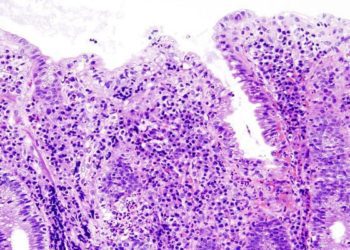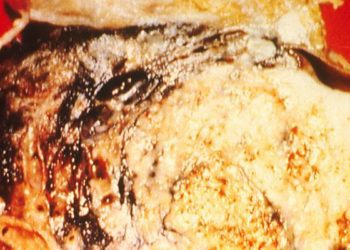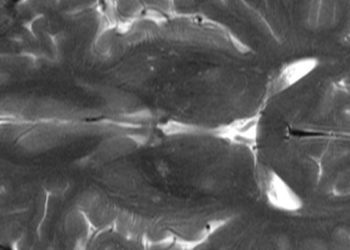Dexamethasone efficacy suggested in high-risk infants with bronchiolitis
Image: PD
1. Infants presenting to the Pediatric Emergency Center (PEC) with bronchiolitis, and an additional personal history of eczema or first-degree relative with asthma, were shown to have shorter time to discharge when given dexamethasone in comparison to controls. Revisit rates to the PEC were similar between groups.
2. Trial infants receiving dexamethasone were less likely to require nebulized epinephrine for continued respiratory distress than controls.
Evidence Rating Level: 1 (Excellent)
Study Rundown: Bronchiolitis is an infection of the lower respiratory tract usually affecting children under two years of age in the winter months. It is clinically characterized by wheezing or crackles with increased work of breathing following a period of upper respiratory symptoms such as rhinorrhea. Prior studies have noted that children with bronchiolitis are at increased risk of developing asthma than controls. As such, patients with personal or family history of atopy are of specific research interest in the pathophysiology and treatment of bronchiolitis. Current evidence-based guidelines suggest only supportive treatment with oxygen and hydration, with consideration of a bronchodilator trial in significant respiratory distress. In this study, infants in the PEC with bronchiolitis and personal or family history of atopy were randomized to receive either dexamethasone or placebo, with both groups additionally receiving salbutamol. Study infants were noted to be ready for discharge from the short-stay unit sooner than controls. Both groups had similar revisit rates to the PEC one week after discharge. This study is limited by its lack of specific side effect data. While steroids are not routinely recommended in the treatment of bronchiolitis, this study suggests potential benefit warranting further evaluation of steroid use in a higher-risk patient group.
Click to read the study published today in Pediatrics
Relevant Reading: Bronchiolitis: Recent Evidence on Diagnosis and Management
In-Depth [randomized control trial]: This randomized control trial enrolled 190 infants presenting to a PEC in Qatar with bronchiolitis who additionally had a personal history of eczema or family history of asthma in a first-degree relative. Median age was 3.5 months. One hundred Infants were randomized to the trial arm, which included 1 mg/kg of dexamethasone on day of presentation and 0.6 mg/kg for four additional days. Ninety control infants received placebo. All infants received salbutamol. Nebulized epinephrine was administered at the clinician’s discretion for continued respiratory distress despite treatment. Infants were determined ready for discharge when they had an oxygen saturation ≥ 94% on room air with clinically improved respiratory exam, and good oral intake. Trial infants were ready for discharge at a geometric mean time of 18.6 hours (95% CI: 14.9 – 23.1 hours), in comparison to 27.1 hours (95% CI: 21.8 – 33.8 hours) for controls. This translated to trial infant discharge in 69% of time (p = 0.015) required for control infants. Trial infants were additionally less likely to require nebulized epinephrine than controls (19 vs. 31 infants, p = 0.03). Follow up was conducted via phone calls by nursing staff assessing for well-being, work of breathing, feeding, and need for additional physician or hospital visits. Specific side effect profiles were not established. Both groups had similar revisit rates to the PEC within one week of discharge.
By Neha Joshi and Leah H. Carr
More from this author: Antepartum and intrapartum events both linked to neonatal HIE, Adult decision rules poor proxy for diagnosing pediatric PE, Pediatric readmissions likely a poor proxy for hospital quality, Quality improvement methods increase adherence to pediatric UTI guidelines, Inhaled nitric oxide in premature infants shows no benefits
© 2013 2minutemedicine.com. All rights reserved. No works may be reproduced without expressed written consent from 2minutemedicine.com. Disclaimer: We present factual information directly from peer reviewed medical journals. No post should be construed as medical advice and is not intended as such by the authors, editors, staff or by 2minutemedicine.com. PLEASE SEE A HEALTHCARE PROVIDER IN YOUR AREA IF YOU SEEK MEDICAL ADVICE OF ANY SORT.









